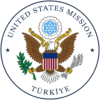Visiting the Embassy or Consulate
Security Screening Procedures
All visitors to the U.S. Embassy or Consulate must follow certain security procedures. Any visitor who declines to be screened by security personnel will be unable to enter the embassy. To avoid delaying your entry and that of those in line behind you, please bring only what is required for your interview. Please arrive 15 minutes earlier than your scheduled appointment.
When the security checkpoint reaches its maximum screening capacity there are delays entering the building. This now happens frequently and interferes with those who have appointments or face legitimate emergencies.
U.S. citizens are not allowed to enter the Consular Section with visa applicants unless they meet specific requirements and have advanced authorization from the Visa Unit.
Security Regulations
Every person that comes to the Embassy or Consulate, along with their belongings, must go through a security screening before entering. The following items are not permitted in the Consular Section. In addition to the list below, security may decide not to admit other unlisted items into the waiting area.
Forbidden Items:
- Purses
- Laptops
- Cell/Mobile Phones (including iPhone & Blackberries)
- Handheld Tablets (iPad or similar) or E-Readers
- Smart watches
- MP3 or similar music players (iPod or similar)
- USB sticks/flash memory devices
- Cameras or Camcorders
- Portable Game Devices
- Luggage, Bags or Backpacks
- Bottled Liquids (including perfume & drinks)
- Flammable Liquids or Lighters
- Weapons or any element that can be used as a weapon, including knives, ammunition, etc.
- Narcotics, drugs, or any illegal substance, as well as medicines without a prescription.
Reasonable Accommodation
If you need reasonable accommodation for your appointment, we encourage you to request your accommodation immediately once you schedule your appointment. We make every effort to provide accommodations to persons with disabilities and medical conditions. Reasonable accommodations vary, depending on the situation and the person’s needs.
Examples of accommodations include, but are not limited to:
- If you require a private appointment due to a medical condition or disability, we may schedule an alternative time for you to come in for your interview.
- If you or your child has special needs that requires a private appointment in a quiet space without distractions, we may schedule an alternative time for you or your family to come in for your interview.
- If you are unable to speak, you may be allowed to respond to questions in an agreed-upon nonverbal manner such as using pen and paper.
- If you are deaf or hard of hearing, you may bring a sign language interpreter to translate during the interview if needed.
- If you have low vision, we may provide you with communications in large print.
If you are unable to provide fingerprints because of a medical condition, including birth defects, physical deformities, skin conditions, you may qualify for a fingerprint waiver for certain fingers.
- Interview waivers are only granted in extreme situations, such as having a medical condition that requires flying in an air ambulance.
The waiting room of the Consular Section and its restroom is wheelchair-accessible.


